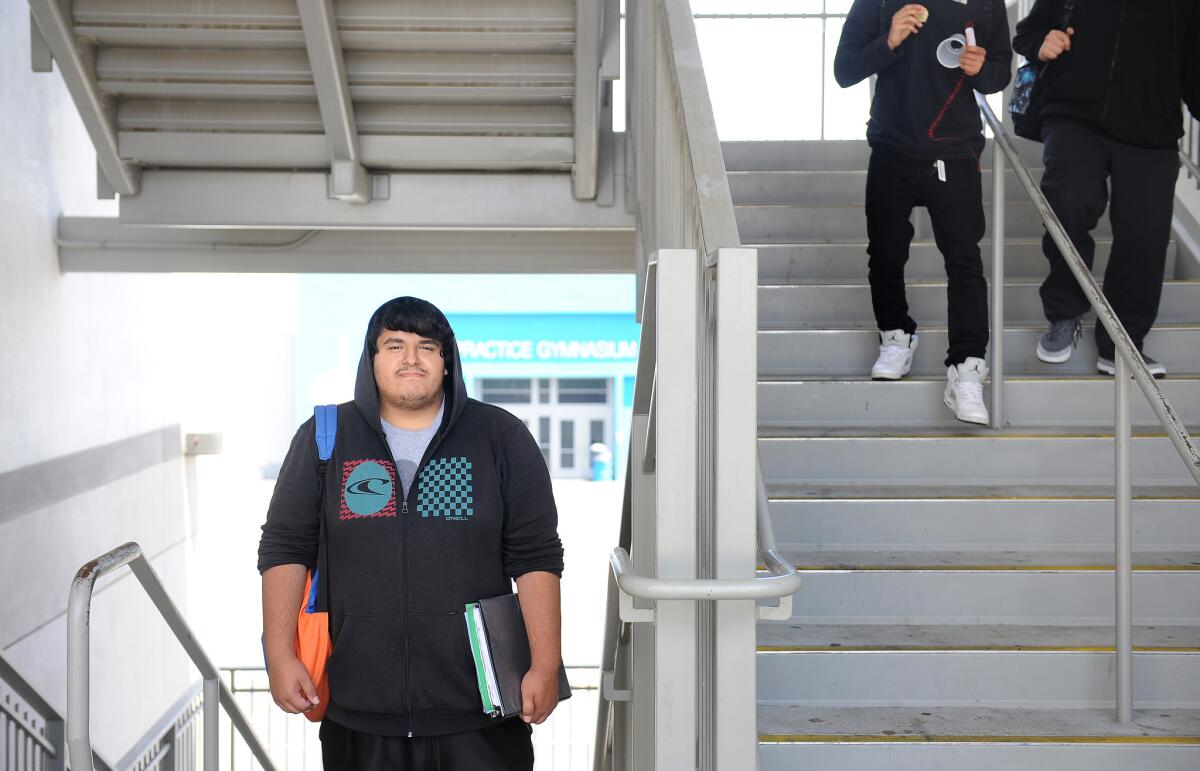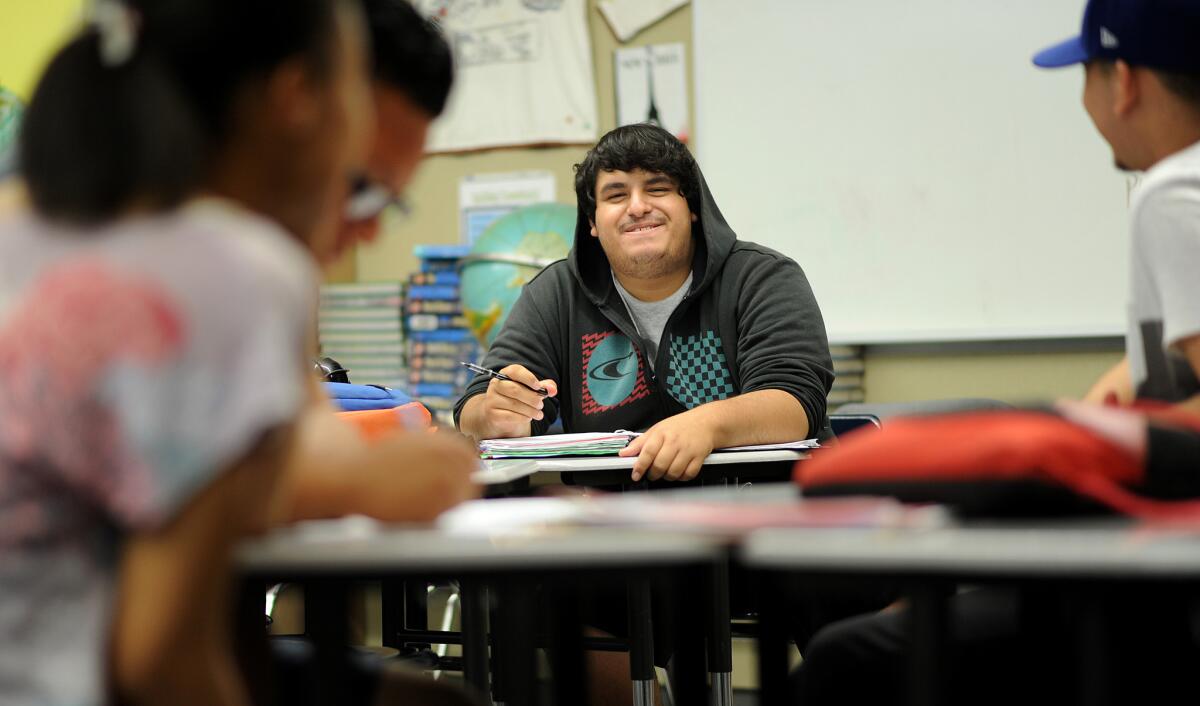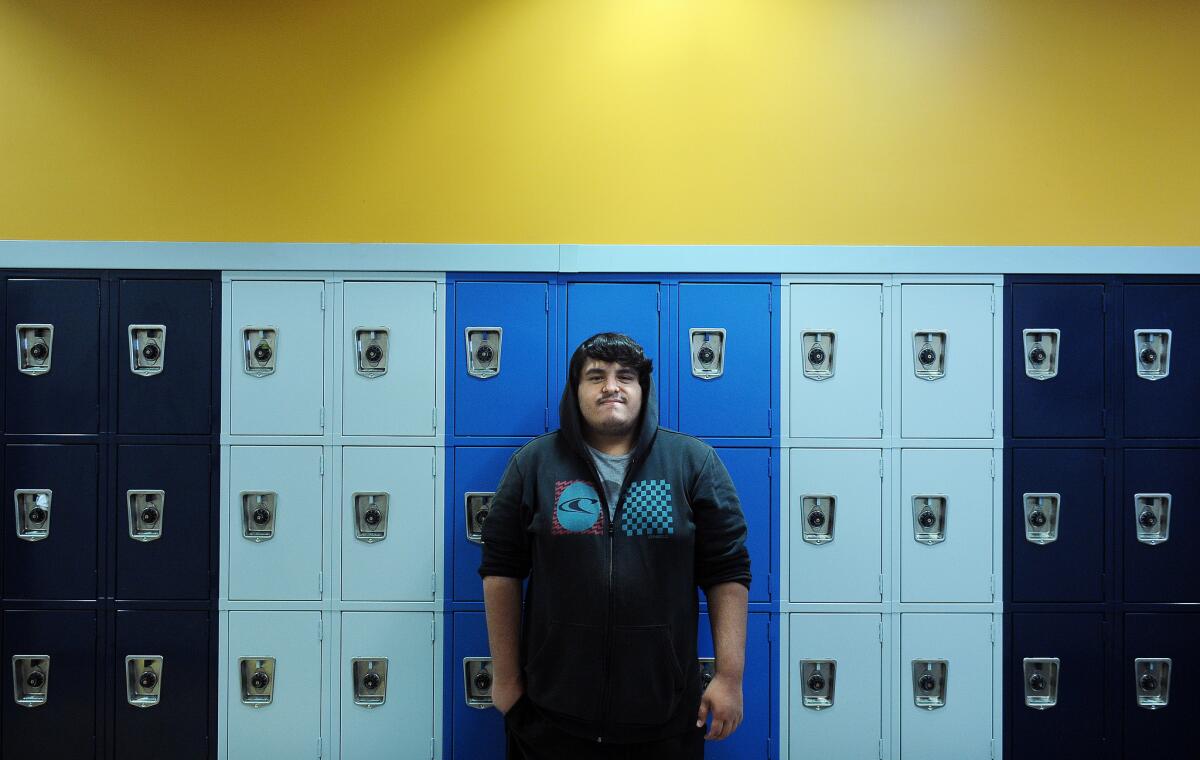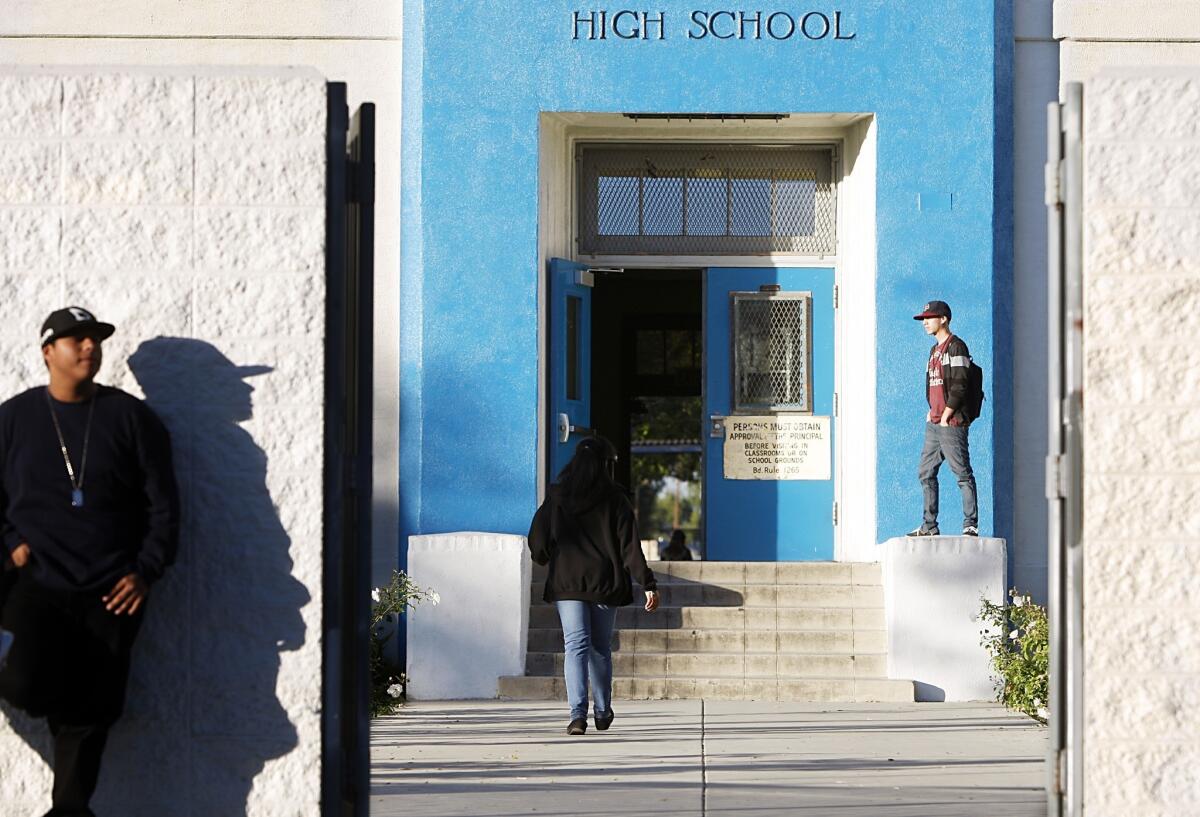From living in cars to UC Davis — one student’s journey

- Share via
The first car he slept in, when he was 6, was his mother’s white Cadillac, parked in South Los Angeles.
Angel Macias, legs crossed, dozed upright in the back seat. His older brother, Armando, sat next to him, often against him, because he needed to stretch his legs to sleep. Their mother snoozed up front, in the driver’s seat.
After that car was impounded, home was a series of stolen cars, so many that they blur in Angel’s mind. Ten years later, he can’t recall how many, what kinds, what colors.
But for this new high school graduate, one detail stands out: His mother often parked the cars near school so her boys wouldn’t be late to class. Inside, they could also get breakfast and wash up in the bathrooms.
NEWSLETTER: Get essential California headlines delivered daily >>
When Angel, now 18, talks about his life, he speaks quietly, eyes cast downward. Until recently, he wore his hair long, shielding his face from view.
He knows that his mentors and peers have come to see his fortitude as an example. He tells his story because he sees that it matters.
Despite years of instability, homelessness and foster homes, Angel has graduated with honors from David Starr Jordan High School, and will be starting at UC Davis this fall.
His mother, who was previously in jail, is in a sober living facility.
School has always been his safe, stable place.

Thousands of students like Angel can be found in the Los Angeles Unified School District, hundreds in his big high school near the Jordan Downs project in Watts.
More than 7,500 students in the system are classified as “foster youth,” and many struggle in school. The district also is responsible, said spokeswoman Gayle Pollard-Terry, for 11,171 students who have been classified as homeless in one way or another.
The district is trying to help students from vulnerable homes do better, supplementing academic learning with out-of-the-classroom support. Resources aren’t spread evenly, and it doesn’t always work. But when it does, the payoff can be great.
“Angel’s story is not the only one,” said Jordan High School Principal Carlos Montes, who has tattoos and wears jeans. “Our No. 1 job is to provide a safe learning environment — so whatever they happen to be going through, once they enter these doors, they feel as though they’re home.”
Angel loves to play video games, and he isn’t shy about saying how good he is at them. His favorite Xbox game is “Destiny,” and in May, he said, letting out a giggle, he was ranked 1,592 out of “like, I don’t know, a couple million something” players in the U.S.
What’s the game about? “You’re this guardian,” he explained. “And you’re fighting for the light against the darkness.”
Angel’s father left before he was born. His mother, Michelle Banda, was addicted to crystal meth. Still, she struggled, he said, “for the sake of me and my brother.”
When he was small, they lived in an apartment in Inglewood. On his first day at Moffett Elementary School, he didn’t want to leave home. By the second day though, he thought school was fun and wanted to go back.
That first car came when they were evicted from his grandmother’s place after she died and his mother fell behind on rent. The family moved into a series of hotels, then a trailer, then — options exhausted — car after car after car. One thing that didn't change was school. He and Armando always went, because their mother said it was important and wanted them to have a better life.
“I didn’t want them to suffer growing up,” Banda said. “In my addiction, I wanted them to have their schooling. I stole cars just to get them to school.”
When she got arrested for car theft, Angel and Armando would sleep at a friend’s. One of those visits stretched into a two-year-long stay that ended abruptly when the apartment was raided.
In what felt to Angel like a lucky break, the brothers went into foster care when he was 8. “Our life flipped,” he said. “We saw a whole different perspective. We were given a lot of hope, time to build ourselves.”
The house in Compton was nice, and the brothers shared a room but got their own beds. The foster parents taught them discipline, how to live differently, how to be — in Angel’s parlance — “civilized.” “They kind of set us straight, as if we were bent out of shape,” Angel said. They took the boys camping, and to see their first snow.
After a few years, Banda got her own apartment, and got the boys back. Then the cycle repeated.
We knew what needed to be done, just because of being homeless.
— Angel Macias, on why he felt motivated in school
The trio moved from apartment to apartment, hotel to hotel. When the boys went into foster care again, Angel said, “In my mind, it was, here we go again.”
This time, the brothers were separated — but only for two days.

His mother’s ex-boyfriend, Jaime Espindola, — the father of her youngest son, Abel, and also Angel’s stepfather — took Angel and Armando into his Watts home.
In all of his moving around, Xbox was a constant, Angel said. So was the focus on the future his Compton foster parents had instilled. Maybe, he began to think, he could one day earn a living making his own video games.
He also read. His favorite book, “The Call of the Wild,” about a kidnapped dog that eventually heads out into nature, reminded Angel of living in the wilds of L.A.
But he and Armando had other plans, which kept them focused, Angel said.
“We knew what needed to be done, just because of being homeless,” he said. “We wanted a different life.”
He came out of the foster care system and was one of the lucky ones.
— Walter Rich, teacher
The separation from his brother and the move into his stepfather’s house happened in 10th grade.
As a result, he left Mountain View High School in El Monte and made his way to Jordan.
His new teachers tried to make him feel comfortable and included, but they noticed that he didn't talk. In Walter Rich’s AP government class, Angel began to participate.
Jordan is what’s known as a turnaround school. It was performing so poorly that, in 2011, the district turned over half the students to a charter school and put the public school under the charge of the nonprofit Partnership for Los Angeles Schools. All teachers were forced to reapply for the jobs. Half did. Just nine were hired.
------------
FOR THE RECORD
10 a.m.: An earlier version of this article said Jordan High School was put under the charge of the nonprofit Los Angeles Education Partnership. The school is under the charge of the nonprofit Partnership for Los Angeles Schools.
------------
Rich is one of those nine. He tried to support Angel by checking on him routinely. “I can see him graduating from college, and then getting a master’s or a doctorate,” he said. “He has the tenacity and the desire.”

Angel knows Jordan’s reputation. “When people think of us young colored teens in Watts or Compton they think, ‘Well, they’re not going to do anything, that guy’s gonna go to jail, that girl’s gonna be pregnant,’” he said.
What makes the difference, Angel said, is the dedication of his teachers, who began to draw him out. His AP calculus teacher would work with students until 7 p.m. Rich gave out his personal phone number. Another teacher paid for Angel to go to prom.
Toward the end of Angel’s junior year, the founder of a camp called Teens Exploring Technology spoke to his sixth-period finance class. He was hooked, and the camp was free. So he spent last summer there meeting tech professionals and developing an app called Tag City that connects businesses looking for creative advertising to graffiti artists. Graffiti, Angel thinks, often gets a bad reputation — but it can be used to spread positive messages.
Angel and Armando still live with their stepfather and Abel, 7, who has autism and is a whiz with an iPhone but can’t talk much.
Angel also is still in touch with their first foster parents, which his government teacher sees as a safety net many other students lack. “He came out of the foster care system, and he was one of the lucky ones,” Rich said.
Armando, 19, who dropped out of Cal State L.A. after a few months, declined to be interviewed.
Michelle Banda is proud of both her boys. “I really wanted them to accomplish something in life,” she said of Armando and Angel. “They have. They’re not into drugs, they’re not into gangs.”
Angel plans to study computer science at UC Davis, mostly sponsored by state and federal financial aid. His stepfather, a truck driver for a freight services company, has offered to work overtime to help.
Angel will arrive at Davis by car, his stepfather at the wheel.
Maybe while he’s in college, he said, he’ll get a car of his own — but not to live in.
He’ll have a dorm room for that.
ALSO
Three things to know about how L.A. schools are using your money
How UCLA is boosting campus diversity, despite the ban on affirmative action
Sign up for Essential California
The most important California stories and recommendations in your inbox every morning.
You may occasionally receive promotional content from the Los Angeles Times.








